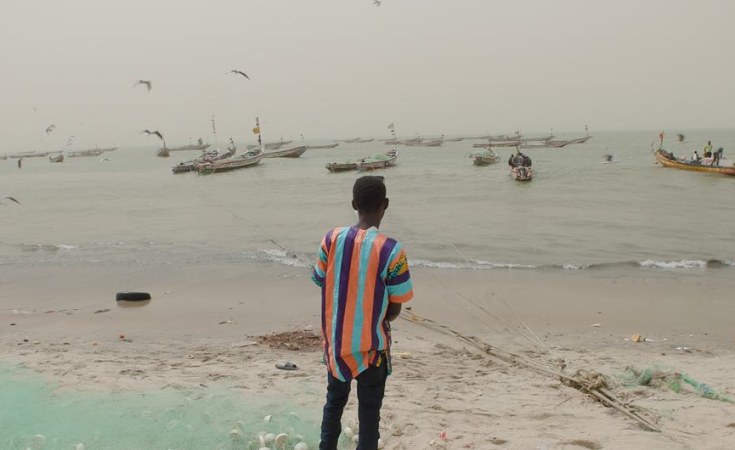On September 27, 2009, Abdulkadir Mohamud called his mother in Columbus, Ohio, to tell her he was boarding a boat from Libya that evening, along with his cousin Nasteha Mohamed Hassan to reach Italy.
The 96 people on the journey boarded one of the risky rubber boats, but that was not going to stop them as they set their sights on realizing their long-awaited journey to Europe.
More than 14 years later, the boat and the occupants are still missing.
"We have not heard from him, dead or alive," says his mother, Nurto Mohamed Mohamud.
Hassan's mother, Maka Mohamud Ali, says none of the people on board reported arriving.
"But we are parents, we cannot give up someone we have not confirmed their death," she said, sounding sad and desperate. "We don't know what to do; God knows."
Ali says her daughter was a smart, bright student who had about a year and half left until she finished university in Mogadishu. But she could not resist the temptation of migrating to Europe because people she knew traveled.
"Students she was studying with traveled -- even her teacher left," Ali said.
"She was overwhelmed, it got into her mindset ... eventually I said to her, 'Go, you have my blessing.'"
The anguish over the lack of information about what happened has taken a toll on the parents.
"They are making us sad all the time," Mohamud said. "They are saying there are people held as slave workers who are chained, it's so unbearable."
Last year, Mohamud contacted a popular social media influencer who traces missing persons and recorded an interview. But the experience exposed her to fraudsters who were determined to exploit her vulnerability.
"A lot of people contacted me; some told me lies and said there are people who are being held hostage in the sea."
One of the scammers, a woman who went to extreme lengths to get her trust, succeeded.
"This crying woman called me, saying she has been reunited with her missing son, saying he was found after captivity in the sea," she explained.
The woman convinced Mohamud that there was a man who helps free people held in the middle of the sea.
Mohamud was eventually connected to the man over the phone. Via mobile money service, Mohamud paid the $2,000 requested by the man. That was the last time she spoke to the fraudsters as they turned off their phones.
Mariam Yassin Hagi Yussuf, Somalia's special envoy for migration and children, said these fraudsters are common. "We saw many cases of people who died long ago but smugglers are still collecting money from them," she said.
"What happens is they beat up one of the migrants in their custody, and they torture them and threaten to kill them if they do not call vulnerable families. They order them to tell vulnerable family [members] that they have seen their missing loved ones."
Ahmed Mohamud Dhuhyare has sent $14,500 so far to his son, Suldan, who is in Libya.
Suldan Dhuhyare, 23, traveled from Bosaso, Somalia, in March 2022, to Yemen and ended up in Libya two months later -- a sign of the collaboration between smugglers.
After five months of captivity, he eventually contacted his father via video call. Dhuhyare said he was shocked by the condition of his son.
"Skeleton hands and chest, his face unrecognizable," he said.
Suldan Dhuhyare said he was beaten by the smugglers and was admitted to hospital recently because of his injuries. He also said he got infected with tuberculosis and was given medications by staffers from the International Organization for Migration, or IOM, in Tripoli. He said he's feeling well now.
Suldan Dhuhyare paid a boat fee and is waiting for a trip to Europe -- not knowing how it will turn out.
The returnees
Despite the dangerous travels and horrifying experiences, the flow of migrants out of Somalia continues unabated.
According to the IOM, a total of 26,352 movements (71% outgoing, 29% incoming) across the border were observed in October 2023, representing a 6% increase compared to September 2023, when 24,816 movements were observed. Most of the people entering Somalia are Ethiopian migrants.
The IOM, which provides administrative, logistical and financial support to Somali migrants, received 132 voluntary returnees from Libya since the beginning of 2023.
One of the returnees is Khadar Hassan Ibrahim, who entered Libya in March 2020.
In early April 2022, Ibrahim was among more than 90 migrants who boarded a rubber boat from the coast of Az Zawiyah, Libya.
"We departed around 3 a.m., we were late because we should have left way earlier to go far into the sea to avoid detection and being intercepted by the coast guard," he said.
At around noon, a helicopter flew over their boat, took pictures and sent their location to the coast guard, he noted. The nearest ship caught up with them and turned them back.
In July 2022, he went to the Somali Embassy and the IOM, and registered to return. Ibrahim was on the waiting list until his return in May 2023.
Ibrahim, 24, returned to his hometown, Wajale, and with the money he received from his parents and an additional $1,387 from the IOM, he bought a tuktuk and returned to his old job.
This report originally aired on Investigative Dossier, a VOA Somali Service radio program.


